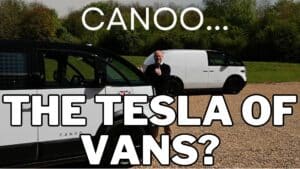Well, as the saying goes, two swallows don’t make a summer, and after September’s excellent performance, the electric van market registration figures for October, when taken in isolation, don’t make for particularly pretty reading.
Let’s take a quick top level look at the market position as reported by the SMMT. Compared to October 2022, overall registrations of LCVs up to 3.5t GVM for the month, are up by 17.7%. with the year to date comparison showing an even healthier increase of 20.5%. Looking at BEV registrations, although year to date the numbers are up by 19.8%, if we compare this October to last we see a fall of 20.2%.
Now, the fun starts when you dig into the detail; the SMMT has suggested that this time last year, one particular fleet registered a large number of electric vans – this certainly could explain the percentage fall, especially when September showed such promise. Distortions are the blight of those of us looking at patterns and trends – for instance Mercedes-Benz almost doubled the numbers of electric vans registered in October compared to the previous month. This is possibly attributable to the arrival of the eCitan and the registration of dealer demonstrators and early customer vehicles. I hope to be getting one to drive very soon!
Let’s take a look at the year to date sales of electric vans, courtesy of the data supplied by our friends at New Automotive. Leading the pack is Vauxhall with 31.6% of the BEV market, the Vivaro Electric accounting for the majority of the numbers. Ford is in second place at 13.2% with the E-Transit, and Peugeot has achieved 10.1% to gain the last place on the podium. There’s a very impressive performance by Maxus, nipping at the heels of the big players with 9.4% to take fourth position, beating Citroen who come fifth with 7.68%.
With the BEV market share year to date remaining unchanged at 5.5% compared to this time last year, where does this leave manufacturers? The SMMT has reduced its BEV registration forecast for 2023 down by 9% to 21,000 units, a market share of 6.3%. This would mean the last two months of this year would have to show some real performance in order to catch up. But, why would manufacturers feel inclined to push for a strong year end? 2024 sees the introduction of the ZEV Mandate when, in that year 10% of all registrations per van manufacturer are required to be BEV, any shortfall costing the company £9000 per vehicle in fines. That 10% means that, overall compared to this year manufacturers will have to almost double the proportion of BEV registrations to ICE, a task which cannot be underestimated. I expect there to be a distinct cooling off period between now and the New Year, with manufacturers strategically delaying as many sales as possible until January in order to give them a kick start – there really is little incentive for further 2023 dated registrations. I think if we end the year at 20,000 units, that will be a good result, and I won’t be surprised if the number is lower.
So, what tactics are on offer to manufacturers when aiming to achieve that 10% nirvana next year? They could create an artificial shortage of ICE vehicles, but the danger there is that if customers are resistant to switching their orders to the BEV vans freely available, total sales will be down with minimal effect on the BEV proportion. Manufacturers could legally collude, in fact, they will be allowed to trade credits, one manufacturer exceeding the 10% being allowed to share the excess with others, either charging a fee (almost certainly) or passing them free of charge (extremely unlikely).They could also attempt to ‘buy’ business with loss leading offers – after all, a £5000 per unit loss is better than a £9000 fine.
But they shouldn’t need to do this. Desperation and panic isn’t good for the industry. We need trade bodies, industry leaders and fleet associations to champion a ‘Plan for Vans’ – to promote positivity, to give van operators confidence that an electric van will work for them, to help overcome prejudice but also to help counter genuine objections. It’s easy to blame the government but it’s not all down to those in Westminster. A credible, clear plan and goals which are achievable will generate this positivity and confidence. We all need this. Not only manufacturers for their targets, but all of us for the sake of the environment, our health and well-being.




